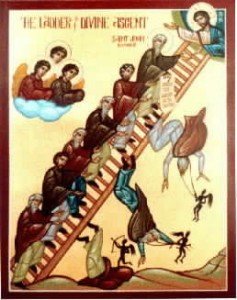 DISCERNMENT is the 26th Step on St. John’s LADDER of Divine ascent. It clearly reminds us that whenever we judge, criticize or accuse others we show that we have no discernment. We may think of someone as a bad person, but we do not consider that if we had been through the same things that he went through, we might be infinitely worse. We are known not only by our works, but also by our efforts and intentions; not only by our achievements and successes, but also by our lot in life. Certainly those who struggle the most against the passions, even if they fail miserably, will receive an ever greater reward than those whose virtues come to them with ease.
DISCERNMENT is the 26th Step on St. John’s LADDER of Divine ascent. It clearly reminds us that whenever we judge, criticize or accuse others we show that we have no discernment. We may think of someone as a bad person, but we do not consider that if we had been through the same things that he went through, we might be infinitely worse. We are known not only by our works, but also by our efforts and intentions; not only by our achievements and successes, but also by our lot in life. Certainly those who struggle the most against the passions, even if they fail miserably, will receive an ever greater reward than those whose virtues come to them with ease.
While it may seem to be a straight-forward thing to discern between good and bad, it is not always so easy. We need the gift of discernment.
The final stage of discernment is to be able to perceive God’s will for each of us. Of course God’s will is made plain to us in the commandments, but the question of how each person can exercise these commandments is not always such a simple matter, nor is it clear how each Christian can commit his life to God. People often find themselves faced with certain dilemmas, such as having to work on Sundays or having a job in which the work may contradict a person’s religious beliefs.
St. John simply tells us that we should always question whether what we do is in accordance with God’s will. The first step to discerning whether something is in accordance with God’s will is our own conscience: Let your God-directed conscience be your aim and rule in everything, St. John says.
I would quickly point out that St. John’s says we should let our “God-directed” conscience be our guide. I shall offer a few words about such a conscience in the next issue.
Do you know what an informed conscience is?
